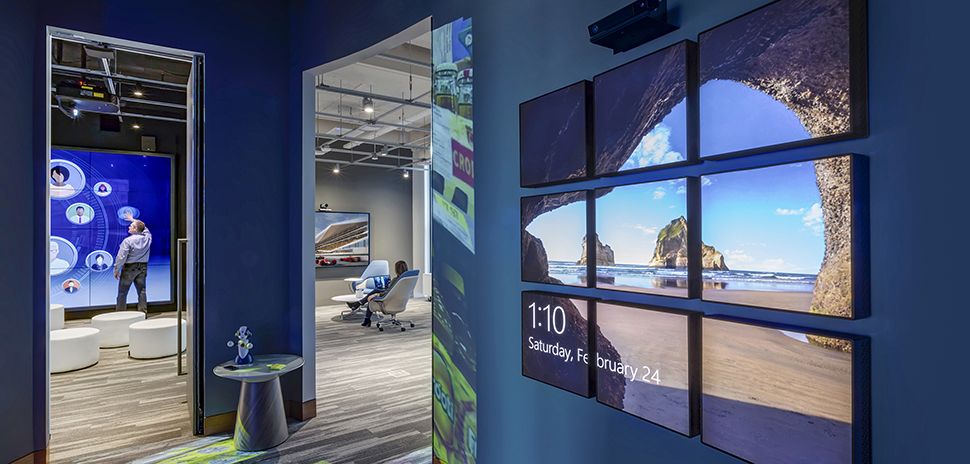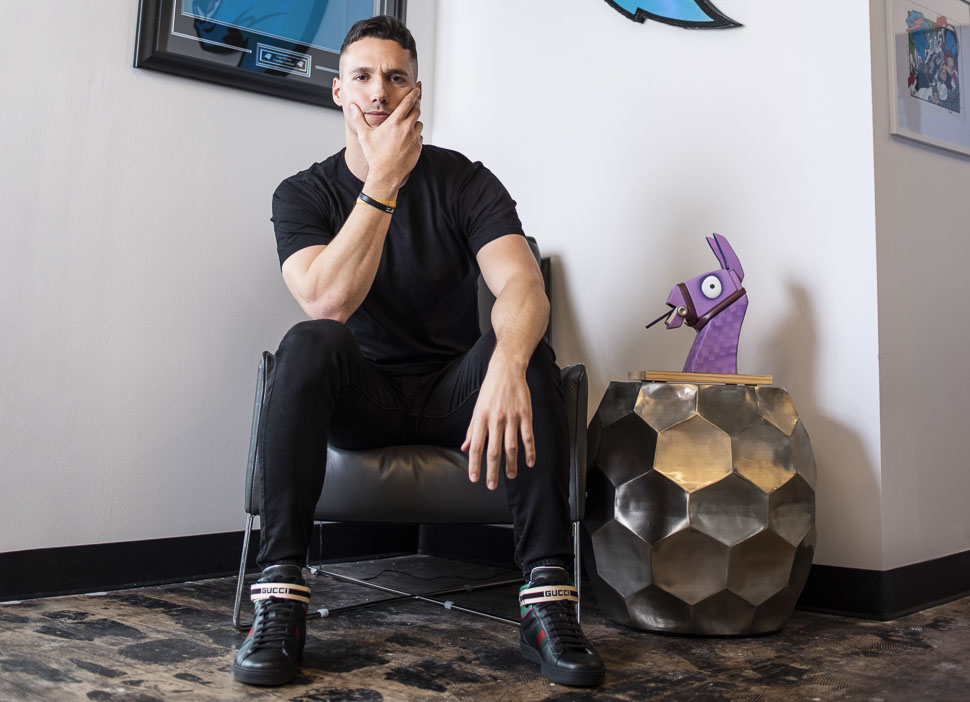Ping pong tables, flexible schedules, and collaboration spaces have become nearly de rigueur for high-tech professionals in the Dallas region, which employs nearly a quarter-million workers, and grew by nearly 30,000 jobs between 2015 and 2019.
While all these niceties make working sound more like Sunday Funday, what employers are finding is that prospective hires are looking for more than fringe benefits.
They’re looking for a mission and meaning in their work. And they’re finding it in the region, where corporate offices are increasingly harnessing terabytes of data to improve their operations.
‘A Greater Goal’
“One day I was getting gas in my Tundra truck, and a guy came up to me, and he says, ‘I really like your truck. You know, there’s an online group for that truck,’” says Mark Dirkson, group manager for Toyota Financial Services’ IT arm and its Digital Academy & Talent Growth. “We have a large following, and in some cases, a cultish following, but what people are starting to discover is, it’s not just the car. It’s the inside-of-the-car experience. It’s the connectedness.”
Dirkson says Toyota Financial’s IT arm—referred to as Information Digital Systems—is rewriting its model to match the intuitive operations of a fintech company. The team’s mission is, in short, to arrange financial means seamlessly for customers, to allow them to drive Toyotas, and to acquire related products and services. Information Digital Systems builds, among other things, the software that Toyota sellers use when arranging financing for buyers and arranging for mobility solutions in the future, he says.
“You can buy financial protection products like gap insurance, key fob insurance, and tire and wheel protection,” he says. “Our core objective is to offer it seamlessly, without any friction. We need talented people to be able to do that.”
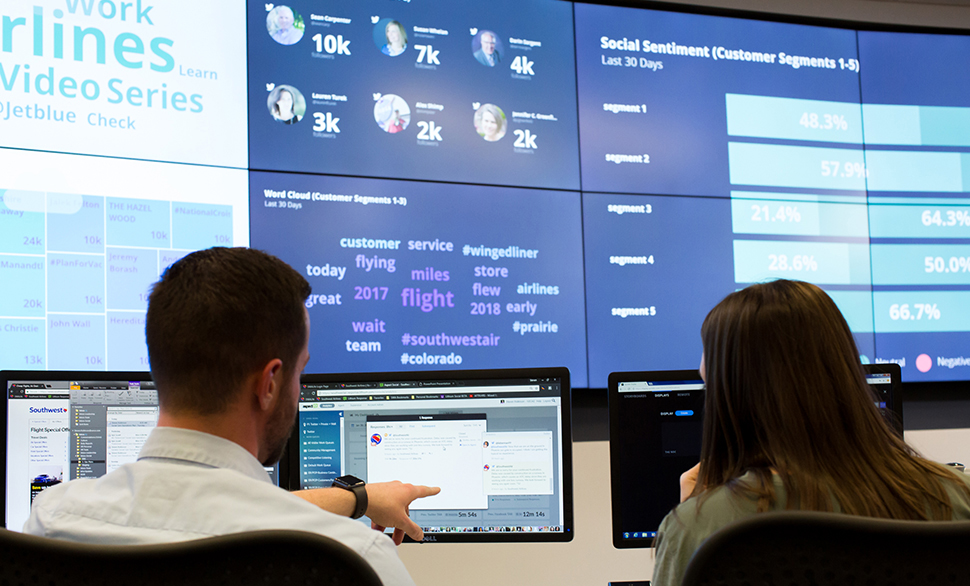
The region’s eighth-largest employer, Southwest Airlines, is known as a pioneer in the social media sphere as well as in information technology. Its state-of-the-art “Listening Center” is a command post where experts in Dallas monitor and manage the company’s many social channels. [Photo: Courtesy Southwest Airlines]
That challenge—smoothly weaving the financial process into the overall Toyota experience—is as much a draw for talent as the Toyota name and lore, says Dirkson, who works with other Toyota Financial Services IT pros at the Toyota Motors North America campus in Plano.
From a technical standpoint, Toyota Financial’s IT team needs scrum masters, business systems analysts, developers, and designers, particularly those who understand the cloud and are able to program in the cloud. Dirkson says while they need professionals who know Java and are familiar with the agile method of project management, that’s just the start of what he’s looking for.
“We like folks who know agile [project management style], but we’re approaching this with a Toyota financial services version of agile; we come in, and help them understand how that ties into the Toyota Way,” he says. The agile project approach allows more flexibility in how projects are executed, compared to its predecessor, waterfall.
“Once you get away from the notion of talent, you ask, ‘Are they the right fit? Do they have the soft skills necessary to thrive in our environment? When you interview with candidates, do they demonstrate a zest to do what they do best? Are they motivated by a greater goal?”’ he says. “We’ve ended up with phenomenal people over the years.”
Drawing IT Talent
Some of the biggest names in tech have major operations in the region. Microsoft’s second-largest U.S. campus—which employs about 2,000—is located in Las Colinas. In early 2019, digital customer service giant Salesforce announced it was leasing 100,000 square feet of the 22-story Union office tower in Uptown Dallas.
In August 2019, Uber announced it was relocating a significant portion of its West Coast operations to the Deep Ellum neighborhood near Downtown Dallas. Uber announced it would relocate 400 employees to Dallas, and employ a total of 3,000 professionals. Amazon Web Services, which leased space in the Galleria area in North Dallas in 2014, employs more than 1,000 team workers who focus on company operations and enterprise sales.
Between 2014 and 2019, tech-driven firms such as Toyota, Raytheon and NTT Data have expanded or relocated headquarters to the region, bringing a strong appetite for information technology talent with them. Like Toyota, many of them are integrating data and a design-build approach across their organizations.
“This region is becoming an IT center,” says Lori McColl, business development director at Zycron, a subsidiary of Dallas-based BG Staffing, which specializes in recruiting IT professionals. “All the quality-of-life things are super important,” she says, describing what’s moving information tech talent to Dallas. “Especially for those who have a family. Single people are more likely to relocate; they may have some other things they’re looking for.”
Earlier in 2019, CompTIA (the nonprofit Computing Technology Association) ranked the Dallas region fourth among 20 U.S. metros as a destination where IT professionals would most likely want to put down roots. Of primary concern for the nearly 1,000 IT pros CompTIA surveyed was cost of living for both Gen Zers and millennials.
They split on motivating factors after that—Gen Z IT pros want affordable housing; millennials are looking for decent commute times and good weather. At least half of the Gen Z workers say having both a meaningful career and income were important considerations. Three-fourths of all millennials say income and job security are the most important considerations.
A 2019 C2ER Cost of Living Survey indicates the Dallas region’s cost of living is roughly half of San Francisco’s, more than half of NYC’s; and a quarter less than in Boston and Seattle.
“When these corporations move here, these people are giddy with what their dollars can buy them,” McColl says. “I can’t think of a better market in the U.S., when you think of the major opportunities. And for families, if something changes with your job, it’s probably not the only job in town. If you can bear with the weather, because the market is so tight, it’s a buyer’s (employee’s) market.”
The demand for skilled IT pros is so intense in the region that BG is encouraging employers to reach beyond just great workplaces, and to offer unlimited vacation time and other benefits.
“I can’t think of a better place for IT professionals,” McColl says.
Plano-based fintech Alkami says job candidates are leveraging that demand in palpable ways.
“We see more and more candidates applying who aren’t local and are willing to relocate at their own expense,” says Courtney Amigh Mrsny, manager of corporate recruiting for Alkami. “We have great schools, affordable homes, and great jobs—what more could you ask for?”
Finding Challenge/Meaning In Work
More than 1,000 IT professionals work at Fidelity Investment’s Westlake 5,600-person campus.
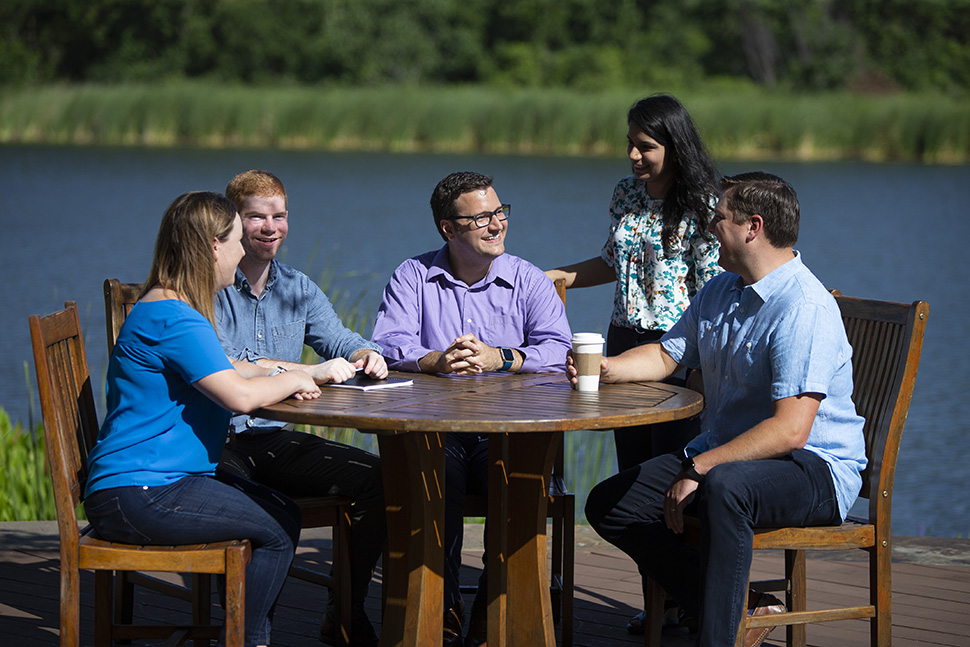
More than 1,000 IT professionals work at Fidelity Investment’s Westlake 5,600-person campus. [Photo Matt Stone]
Employees are recruited not only with benefits—from repayment of their student loans, to collaborative work spaces, to having their oil changed while they work—but also with the notion of personal and professional development.
The question of “How am I going to grow as a person and learn?” is often a factor job candidates pose when considering jobs, says Tammy Gilbert, CIO and Texas Regional Leader for Fidelity. The Westlake IT team works on matters affecting Fidelity’s digital infrastructure, cybersecurity, and app development, which includes personal investment portfolios and workplace investments, she says.
“They don’t get the feeling that they’ll be boxed in for the next 30 years,” Gilbert says. “We have a lot of focus on work-life balance here. Used to be, your job is your job and your home life is your home life. But they’re intertwined.”
At Fidelity, there are no permanent roles, which last three to four years, Gilbert says. Jobs are completed in sprints, not in long-term, drawn-out endeavors.
“We like them to try new things,” she says. “It brings diversity of thought. When you have a team that works together for years, they can be a bit stagnant. Moving around keeps things dynamic, and addresses problem-solving in different ways.”
How does Fidelity’s team react to this?
“Our employee base loves it,” she says. “They demand it. We’re seeing millennials who want to learn and grow. They’re not interested in moving up the corporate ladder. They’re interested in learning and experiencing new things.”
On the “personal growth” side of things, Fidelity also encourages its employees to get involved in the community. For example, last year, more than 100 Fidelity technologists teamed up with 15 nonprofits to solve their tech challenges. One such endeavor lead Fidelity techs to a four-month project with Southern Methodist University’s The Budd Center, to use data visualization to more quickly identify local public-school students who are struggling.
Changing the Drive, Leveraging Population Growth
The region’s expanding population, access to universities, and a diversity of people and talent prompted State Farm to choose Richardson to serve as one of its hubs years ago.
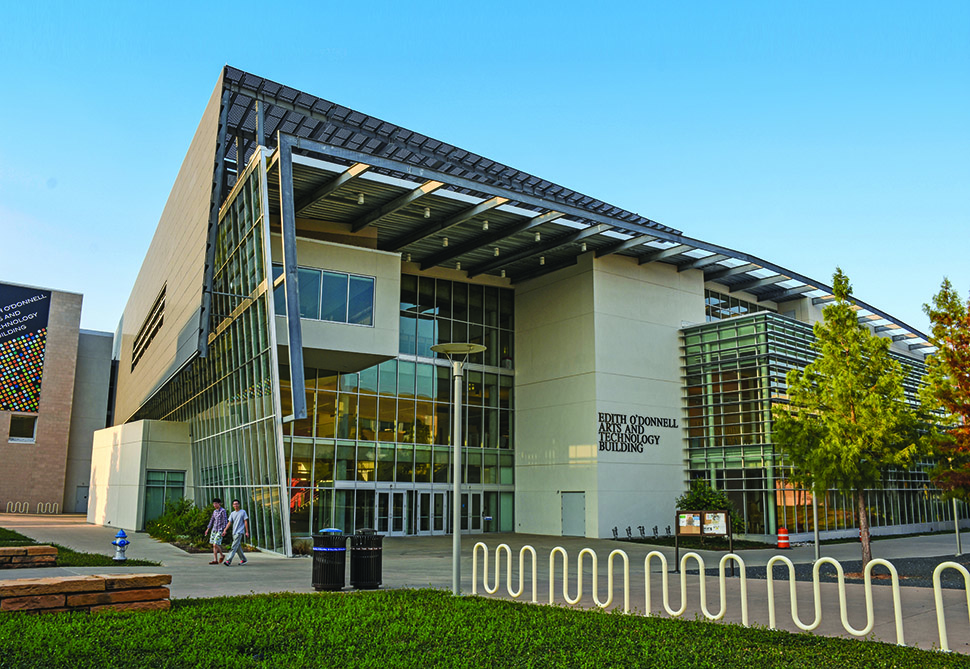
State Farm has also created a satellite campus at the University of Texas at Dallas campus in Richardson, where students work on State Farm projects. [Photo: Andrew Smith]
“Our overall enterprise talent (recruitment) strategy is, ‘How do we leverage the vibrancy of this market?’” says Mike Fletcher, enterprise technology executive at State Farm’s CityLine campus. State Farm hasn’t been shy about harnessing student brain power.
Aside from reimbursing workers for up to $7,500 per year in tuition for approved degrees, among other benefits, State Farm has also created a satellite campus at the University of Texas at Dallas in Richardson, where students work on State Farm projects, including its Drive Safe & Save program.
That initiative allows State Farm customers to use driving data to help improve their driving habits, and, in the process, receive discounts for good driving.
“Upper-level UTD students do capstone programs,” for State Farm, Fletcher says. “They’ve worked in the [Drive Safe & Save] telematics space. It’s been fascinating. I would say the talent pool is vibrant and diverse, and yes, it’s competitive. Not just at UTD, but other schools as well.”
Like other high-tech employers, team members from State Farm attend meet-ups and conferences that focus on areas they’re developing. It gives them a chance to share what they’re working on, and to learn what projects/challenges their peers are working on.
‘Working With Friends’
Dallas-based Active Network is no exception, allowing jeans at work, a happy hour every pay day, yoga every Wednesday at lunch, and two extra paid off days per year to allow employees to pursue their favorite activities.
Active Network—a software-as-a-service company that develops apps for organizations such as Tough Mudder, 5ks, and triathlons—views its employees among its biggest talent lures.
“Not only do we hire for skills, but also to make sure the teams can work well together,” Jeanette Revis, a firm recruiter, says in an email. “Many of our employees have friendships with coworkers outside of the office.”
Many managers have risen through the ranks at Active Network, further contributing to a low turnover rate, she adds.
“Being in a midsize company, our employees can directly see how their work impacts and contributes to the company,” she says.
Cultivating Talent
“The talent gap is significant,” says Karen Moree, co-founder of AustinCSI, which assists companies in digitizing their operations. “Some of our job is attracting talent here … [but] talent here can be cultivated to meet demands.”
Moree says often AustinCSI needs employees with non-technical backgrounds, such as effective writers, or people with excellent interpersonal skills. She says often, those professionals can learn the technology necessary to get the job done.
“We’ve gambled, and we’ve [sometimes] missed,” in making hires, she says. “There are key things we look for when hiring—it comes from looking at how hungry they are. It’s who they are as a person. More than the hard skills, it’s the soft skills. We typically meet with a lot of their parents. We’re a small company, and when you meet the parents, you get an indicator of what they will turn out like.”
This article was originally published in Dallas Innovates: The [Tech] Talent Issue.
Read it online
Dallas Innovates: The [Tech] Talent Issue, a special edition of the Dallas Innovates Magazine, looks at how companies in Dallas-Fort Worth are attracting and retaining the best talent. Startups, corporates, nonprofits, and organizations work hard to create a strong culture, promote diversity, and implement training programs that can help achieve success.
![]()
Get on the list.
Dallas Innovates, every day.
Sign up to keep your eye on what’s new and next in Dallas-Fort Worth, every day.

